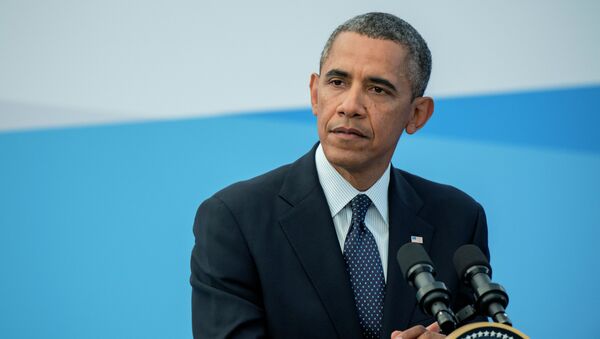WASHINGTON, November 14 (Sputnik) — As world leaders met in Beijing at the Asia-Pacific Economic Cooperation Forum, President Obama used the trip to mark his “deep commitment” to Asia by pushing for a “Trans-Pacific Partnership” and a deeper military alliance. This “pivot to Asia” represents an aggressive attempt by American interests to destabilize the region while isolating and encircling China and Russia.
While much of the text is still being kept from the people who would be forced to abide by it, portions regarding the environment and intellectual property have leaked, providing an opportunity to view the intentions of the nations that are party to the partnership.
In a section labeled “Voluntary Mechanisms to Enhance Environmental Protections,” the proposed document suggests that, “the parties recognize that flexible, voluntary mechanisms, such as voluntary auditing and reporting, market-based incentives, voluntary sharing of information and expertise, and public-private partnerships, can contribute to the achievement and maintenance of high levels of environmental protection and complement domestic regulatory measures.”
Stressing “voluntary” mechanisms is problematic because they represent a total surrender to the corporate energy producers, and as Americans and Australians have learned recently, they often lead to large scale human and environmental disasters.
In North Carolina, Republican governor Pat McCrory, a former Duke Energy employee, urged the state to move away from environmental regulation and allow the company to “self-regulate.” In February 2014, Duke Energy was responsible for a spill of coal ash and wastewater into the Dan River which polluted the water supply for thousands of residents.
In Australia, Prime Minister Tony Abbott has insisted that “coal is good for humanity,” even while lax regulations were blamed for deaths and mine collapses throughout the country, including the Ranger mine, as well as at Pike River in New Zealand.
It is clear that these governments represent the interests of the energy industries even before reading the rest of the article on regulation in the TPP, which states that governments should encourage energy companies to promote products which “are truthful, not misleading and take into account scientific and technical information.” With the Canadian and American governments promoting tar sands oil, will their consumers receive truthful information about how much dirtier it is compared to conventional oil, or will other governments also bow to their pressure and cover up that information?
How Abbott can square his statement with that portion is unclear, but it is nothing compared to Republican Senator James Inhofe of Oklahoma, who is set to chair the Environment and Public Works committee in the next Congress, and who has insisted that global warming is the “Greatest Hoax”. Needless to say, his campaigns are heavily financed by oil and gas concerns which will benefit greatly from his position and from American insistence that “voluntary regulation” becomes the norm for energy exploration and development in the TPP nations.
There is no section on truthful scientific information in the article regarding climate change, nor any recognition of how increasing coal production in Pacific Rim states could present an existential threat to several smaller South Pacific islands. There is also no mention of the environmental problems which were created during previous decades of unregulated trading, such as the Great Pacific Garbage Patch, which would likely increase in size if there is more trade and no regulations on ships or efforts aimed at cleanup.
Environmental destruction is not the only dangerous part of the TPP, as the section on Intellectual Property (IP) threatens to raise the cost of medication by limiting access to generic drugs.
The roots of this section lay with the American health care industry, which profited for many years by exploiting the sick people of America to create huge profits for their CEOs. Democrats in Congress passed health care legislation in 2010 which slightly regulated this market, so these companies are now looking overseas for revenue streams.
The Canadian chapter of Doctors Without Borders notes that the IP provisions “could give pharmaceutical companies longer monopolies over brand name drugs. This would allow them to charge high prices for longer periods of time and either stop or delay the generic competition from producing less expensive versions that are vital to global health.”
Sublimating general health and the environment to the will of multinational corporations through secret negotiations is being sold as a way to develop the economies of Pacific Rim nations. Previous trade deals like NAFTA provided mostly low-paying jobs and reduce wages for existing jobs.
As negotiations continue, it remains unclear if these outstanding issues can be resolved, if President Obama will receive Congressional approval, or if member nations can find the courage to resist signing once the text of the deal becomes better known and the intentions behind the treaty become clear.
In the words of former Malaysian Prime Minister, Tun Dr Mahathir Mohamad, “The [Trans-Pacific Partnership] is just a ploy by the United States to match China's growing economic threat by putting all the Asia-Pacific countries in its pocket.”
It is certainly possible that the Asian nations in the deal: Brunei, Malaysia, Vietnam, and Singapore, are using the talks with America to pressure China for concessions as they attempt to negotiate their own version of TPP to create the Free Trade Area of the Asia Pacific (FTAAP).
America’s attempt to deepen its influence across the Pacific Ocean is not limited to economic consolidation. Military cooperation between the United States, South Korea, and Japan has intensified in recent years, as Japan and South Korea have developed into major non-NATO allies.
The scope of the military collaboration will be examined in an upcoming article, because taken in context with this trade agreement, it represents an aggressive attempt by American interests to destabilize the region while isolating and encircling China and Russia.



